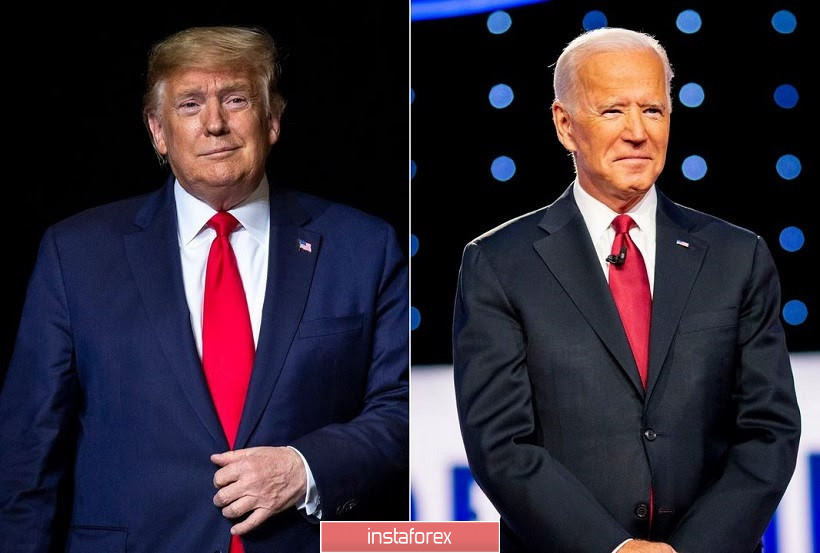The dollar index continues to slide. To date, there is no single fundamental factor that would serve as an anchor for the US currency. The greenback is rather hung with numerous "anchors" that put significant pressure on it. The political standoff in the United States is growing, and the Democrats' accusations against US President Donald Trump are getting tougher every day. For example, over the weekend, the Democratic party accused the head of the White House of almost preparing to sabotage the election. Nevertheless, Trump's rating began to gradually recover, and the gap with Biden, respectively, reduced. This fact is no less alarming for investors, especially in the context of the "cold war" between Washington and Beijing. All these fundamental factors do not allow the dollar bulls to develop their offensive – a deep decline follows after the corrective growth: this time the dollar index has already entered the area of the 92nd figure.

So, perhaps the main news of the weekend was that the Speaker of the House of Representatives, Democrat Nancy Pelosi is recalling Congressmen from summer break this week to vote on a bill protecting the US Postal Service (USPS). It is worth recalling here that the presidential elections in November will be held (including) by mail - this form is explained by the need to observe social distancing in the context of the spread of COVID-19 in the United States. Trump opposes this practice, believing that voting by mail could lead to massive fraud and delay in the counting of votes. Amid such political battles, he refused to provide funding for the USPS out of concern that the money would be used "to speed up voting by mail." On the other hand, the Democrats accuse Trump of deliberately collecting factual information about mail delivery delays in order to have arguments against such a vote.
Due to the reluctance to fund the USPS, many Democrats and their supporters accused Trump of trying to rig the upcoming presidential elections. In a letter to members of the House of Representatives, Pelosi said that a bill would be put to the vote "prohibiting any changes to postal services that were introduced on January 1, 2020." According to preliminary information, the voting may take place next Saturday.
It is worth recalling that the bill on providing assistance to the US economy worth one trillion dollars has remained a draft – the parties could not agree on its main positions. Last week, Treasury Secretary Steven Mnuchin assured reporters that talks were "about to resume" and a compromise could be reached within days. But, as they say, "who is still there", and against the background of recent events, we can assume with a high degree of confidence that the law will not be adopted. Many experts consider the executive orders that Trump signed as a kind of "patch", while the American economy needs full-fledged assistance (worth 2-3 trillion dollars). But negotiations on this issue have finally "stalled", and this fact puts additional pressure on the greenback.
The uneasy relationship between the US and China also remains in the focus of investors' attention. Washington and Beijing minimize contact amid the coronavirus pandemic. For example, a previously scheduled video conference between the US and China to discuss a trade deal between the parties was canceled this weekend. According to the official comment, "the meeting was postponed to a later date without specifying a specific new date."
Obviously, the parties will discuss the second part of the trade deal after the presidential elections in the United States - Biden and Trump have too different approaches to the "Chinese issue." Meanwhile, the intrigue of the elections remains - if over the past several weeks the leader of the Democrats has confidently increased the gap from the head of the White House, the latest opinion polls suggest the opposite. At the moment, Joe Biden's rating averages 49% in the 15 American states that matter the most in terms of election outcome, while Trump's rating is 48%. At the same time, according to the results of the poll, which was conducted in early June, 55% of respondents were ready to vote for Biden, and only 40% for Trump. All this suggests that Trump has significantly reduced the gap in popularity among voters from his opponent over the past few months. And this fact also exerts background pressure on the dollar, given its attitude to the US-China conflict and the Federal Reserve's monetary policy.

Thus, the dollar's fall is justified, although the pressure is due to several fundamental factors – there is no single catalyst. The economic calendar is almost empty on Monday, which means that the dollar will continue to focus on near-market factors (continued political battles in the US, coronavirus reports).
If we talk directly about the EUR/USD pair, here we see that the price has settled above the resistance level of 1.1810 (the Tenkan-sen line on the daily chart). Now the nearest price barrier is located at 1.1940 - this is the upper line of the Bollinger Bands indicator on the same timeframe. From the current positions, we can consider longs – at least to the round mark of 1.1900, which can also act as a resistance level.





















